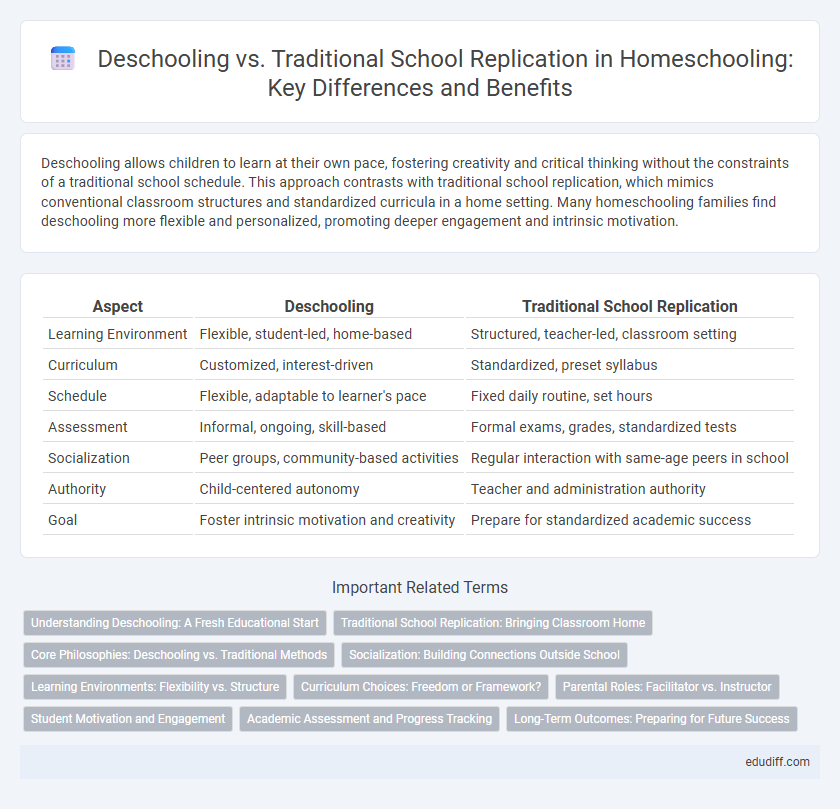Deschooling allows children to learn at their own pace, fostering creativity and critical thinking without the constraints of a traditional school schedule. This approach contrasts with traditional school replication, which mimics conventional classroom structures and standardized curricula in a home setting. Many homeschooling families find deschooling more flexible and personalized, promoting deeper engagement and intrinsic motivation.
Table of Comparison
| Aspect | Deschooling | Traditional School Replication |
|---|---|---|
| Learning Environment | Flexible, student-led, home-based | Structured, teacher-led, classroom setting |
| Curriculum | Customized, interest-driven | Standardized, preset syllabus |
| Schedule | Flexible, adaptable to learner's pace | Fixed daily routine, set hours |
| Assessment | Informal, ongoing, skill-based | Formal exams, grades, standardized tests |
| Socialization | Peer groups, community-based activities | Regular interaction with same-age peers in school |
| Authority | Child-centered autonomy | Teacher and administration authority |
| Goal | Foster intrinsic motivation and creativity | Prepare for standardized academic success |
Understanding Deschooling: A Fresh Educational Start
Deschooling offers a fresh educational start by allowing children time to transition from traditional school routines and expectations, fostering natural curiosity and self-directed learning. Unlike traditional school replication, which mirrors conventional classroom settings at home with fixed schedules and curricula, deschooling emphasizes flexibility, emotional adjustment, and individualized pacing. This process is essential for resetting mindsets and nurturing a positive, sustainable approach to homeschooling.
Traditional School Replication: Bringing Classroom Home
Traditional School Replication in homeschooling involves mimicking the structure, curriculum, and schedules of public or private schools within the home environment, often using textbooks, lesson plans, and standardized testing. This method emphasizes routine, direct instruction, and subject-specific learning similar to classroom settings, aiming to provide consistency and measurable academic progress. Families opting for this approach often seek to maintain the educational standards and social expectations found in conventional schooling while benefiting from home-based flexibility.
Core Philosophies: Deschooling vs. Traditional Methods
Deschooling emphasizes self-directed learning and the dismantling of conventional school structures, fostering intrinsic motivation and personalized education. Traditional school replication relies on structured curricula, standardized testing, and teacher-led instruction, focusing on uniformity and measurable outcomes. Core philosophical differences lie in autonomy and flexibility versus conformity and accountability within educational environments.
Socialization: Building Connections Outside School
Deschooling emphasizes socialization through diverse community interactions, promoting organic relationship-building beyond structured classrooms. Traditional school replication often contains socialization within scheduled school hours and fixed peer groups, limiting exposure to broader social dynamics. Homeschool families engaging in deschooling practices typically access varied social settings like co-ops, extracurriculars, and community events, fostering adaptive social skills and meaningful connections.
Learning Environments: Flexibility vs. Structure
Homeschool deschooling fosters flexible learning environments that prioritize student-driven exploration and adaptability, contrasting with traditional school replication which maintains rigid schedules and structured curricula. This flexibility supports personalized pacing and varied educational resources tailored to individual learning styles. Research indicates that flexible learning environments in homeschooling can enhance engagement and intrinsic motivation compared to the standardized approach found in conventional schooling.
Curriculum Choices: Freedom or Framework?
Deschooling emphasizes personalized curriculum choices that foster freedom and creativity, allowing learners to explore topics based on interests and real-world relevance without strict adherence to standardized frameworks. Traditional school replication often relies on structured curricula with preset objectives, designed to ensure consistency and measurable outcomes across grade levels. Homeschool parents navigating curriculum choices must decide between the flexibility of deschooling approaches or the stability offered by conventional educational models.
Parental Roles: Facilitator vs. Instructor
In homeschooling, parental roles shift significantly between deschooling and traditional school replication approaches. Deschooling emphasizes parents as facilitators who create a learner-centered environment, fostering curiosity and critical thinking. Traditional school replication positions parents as instructors, closely guiding curriculum delivery and maintaining structured schedules similar to formal schools.
Student Motivation and Engagement
Deschooling fosters intrinsic student motivation and engagement by allowing personalized learning paces and interests, contrasting sharply with traditional school replication that often relies on standardized curricula and external rewards. Research shows that students in deschooled environments demonstrate higher levels of curiosity, self-direction, and emotional investment in their studies compared to those in conventional schooling models. This shift supports deeper cognitive engagement and long-term educational growth by prioritizing learner autonomy over rigid structure.
Academic Assessment and Progress Tracking
Academic assessment in deschooling emphasizes personalized learning milestones and qualitative progress rather than standardized testing prevalent in traditional school replication. Progress tracking in deschooling involves flexible, narrative-driven evaluations tailored to the child's unique educational journey, contrasting with the rigid, data-heavy report cards and grade systems in conventional schooling. This approach fosters intrinsic motivation and adapts to individual learning rhythms, often resulting in deeper comprehension and skill mastery.
Long-Term Outcomes: Preparing for Future Success
Deschooling fosters critical thinking, creativity, and self-directed learning skills that contribute to long-term success by adapting to individual strengths and interests. Traditional school replication emphasizes structured curricula and standardized testing, which may limit flexibility but ensures familiarity with conventional academic benchmarks. Students who deschool often demonstrate higher adaptability and problem-solving abilities essential for future career challenges and lifelong learning.
Deschooling vs Traditional School Replication Infographic

 edudiff.com
edudiff.com